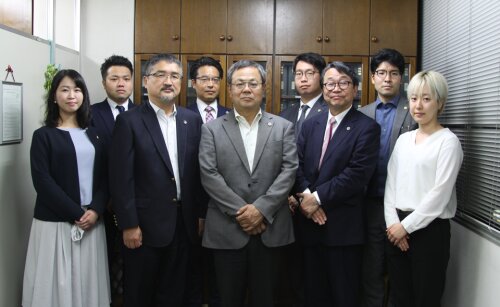Best Bankruptcy Lawyers in Shizuoka
Share your needs with us, get contacted by law firms.
Free. Takes 2 min.
List of the best lawyers in Shizuoka, Japan
About Bankruptcy Law in Shizuoka, Japan
Bankruptcy in Japan is governed by national statutes rather than by prefecture-specific laws. The main laws are the Bankruptcy Act, the Civil Rehabilitation Act, and the Corporate Reorganization Act. These statutes set out procedures for liquidation, restructuring and rehabilitation of both individuals and companies. In Shizuoka Prefecture, bankruptcy and rehabilitation petitions are processed by the Shizuoka District Court and its branches, which apply the national laws and established court practices to local cases.
There are three common types of insolvency procedures that people and businesses in Shizuoka may use:
- Bankruptcy procedure - a liquidation process under the Bankruptcy Act in which a trustee is appointed to collect and sell the debtor's assets and distribute the proceeds among creditors.
- Civil rehabilitation procedure - a reorganization option under the Civil Rehabilitation Act often used by individuals and small businesses to propose a repayment plan and continue operations where feasible.
- Corporate reorganization - a procedure under the Corporate Reorganization Act primarily for larger corporations seeking to reorganize liabilities while remaining in business.
Which procedure is appropriate depends on the debtor's financial condition, the presence of viable business operations, the types of creditors and claims involved, and the goals of the debtor and creditors.
Why You May Need a Lawyer
Many situations make legal help advisable when facing insolvency in Shizuoka:
- Complex debt structure - multiple creditors, cross-guarantees, or secured creditors complicate filing and distribution.
- Business continuation - if you want to try to restructure and keep operating, a lawyer can help prepare and negotiate a rehabilitation plan.
- Negotiations with creditors - lawyers negotiate settlements, propose repayment plans and represent you at creditors meetings.
- Court procedure and filings - bankruptcy and rehabilitation require precise documents, creditor lists, asset inventories and legal pleadings. Mistakes can delay or harm your case.
- Asset protection and exemptions - lawyers advise on which assets may be protected, which may be sold in liquidation, and how to minimize loss lawfully.
- Criminal risk and investigations - suspected fraud, concealment of assets or false statements can lead to criminal investigation. A lawyer protects your rights and advises on disclosure.
- Cross-border or multi-jurisdictional debt - if you have debts or assets outside Japan, specialized counsel is needed to coordinate foreign matters.
- Access to legal aid and fee arrangements - lawyers can explain available legal aid, contingency arrangements or reduced-fee services if you qualify.
Local Laws Overview
Although insolvency laws are national, certain local institutions and practices are important in Shizuoka:
- Court jurisdiction - The Shizuoka District Court and its branches handle filings within the prefecture. Filing locations and procedural schedules will follow the court's local rules and calendar.
- Trustee appointments - Trustees in bankruptcy are appointed by the court from lists of qualified insolvency trustees. Local practice may influence how appointments and case management are conducted.
- Creditor meetings - Courts commonly convene creditor meetings in the district where the debtor had principal place of business or residence. Local creditors and banks often appear at these meetings.
- Interim measures - Courts may grant provisional measures to preserve assets or stay enforcement actions once a petition is filed or when a provisional disposition is requested. The timing and availability of these measures depend on the case facts and the court's discretion.
- Treatment of specific debts - Certain claims such as social insurance contributions, public taxes and fines may have distinct treatment in distribution or discharge. National law governs these priorities, but local tax offices and social insurance offices will be parties in practice.
- Debt counseling services - Shizuoka municipal offices, prefectural consumer centers and local bar associations provide consumer debt counseling and may refer people to lawyers or debt relief programs.
Frequently Asked Questions
What is the difference between bankruptcy, civil rehabilitation and corporate reorganization?
Bankruptcy generally means liquidation under the Bankruptcy Act - assets are gathered and sold and creditors are paid in order of priority. Civil rehabilitation focuses on restructuring debt through a court-approved repayment plan and may allow individuals or small businesses to continue operating. Corporate reorganization is a more complex reorganization for larger companies under the Corporate Reorganization Act. Choice depends on viability, size and goals.
How do I start a bankruptcy or rehabilitation case in Shizuoka?
You start by filing a petition at the Shizuoka District Court or its branch with appropriate documents - a petition form, list of creditors, asset inventory, income and expense statements and supporting evidence. A lawyer can prepare the petition and request provisional measures if enforcement by creditors is imminent.
Will filing bankruptcy stop creditors from seizing my property immediately?
Filing can lead to court measures that prevent individual creditors from continuing certain enforcement actions, but automatic stays are not identical to those in some other countries. The court may issue provisional dispositions or injunctions to preserve the estate. Timing and scope depend on the procedure and the court's order. Consult a lawyer quickly to request protective measures.
How long does a bankruptcy or rehabilitation procedure take?
Duration varies widely. Bankruptcy liquidation can take several months to a few years depending on complexity and asset recovery. Civil rehabilitation may take one to several years while a repayment plan is implemented. Corporate reorganization can be longer. Case-specific facts determine timing.
Can I keep my home or personal belongings?
Some personal effects and basic household goods are generally exempt in practice, but valuable assets, real estate and non-exempt property may be liquidated in bankruptcy. In rehabilitation, you may propose a plan that allows you to keep assets while repaying creditors. A lawyer can examine exemptions and negotiate options.
Will my debts be discharged after bankruptcy?
After the bankruptcy trustee completes liquidation and the court concludes the case, remaining unsecured debts may be discharged, but some claims such as certain tax liabilities, fines and debts stemming from intentional wrongful acts may not be dischargeable. Discharge rules depend on the law and case details.
How will bankruptcy affect my credit record and ability to borrow in the future?
Bankruptcy is recorded and will negatively affect your credit history for years. Post-bankruptcy, it can be difficult to obtain loans or credit immediately, but many people rebuild their credit over time through steady income, responsible financial behavior and time.
Can my spouse or guarantor be affected if I file for bankruptcy?
Yes. If a spouse is a joint debtor or a guarantor for your debts, creditors may pursue the spouse for repayment. Personal bankruptcy addresses the filing individual's obligations, not automatically those of guarantors, unless they file separately.
How much does it cost to hire a bankruptcy lawyer in Shizuoka?
Legal fees vary by case complexity and lawyer. Some lawyers offer fixed-fee packages for consumer bankruptcy, while corporate matters usually involve hourly billing or negotiated fees. If you cannot afford fees, you may qualify for legal aid or reduced-fee services through the Japan Legal Support Center or local bar association consultation programs.
What alternatives to formal bankruptcy should I consider?
Alternatives include informal debt negotiation with creditors, agreed settlements, consumer debt consolidation, voluntary repayment plans and civil rehabilitation as an alternative to liquidation for those who can repay over time. Seeking early legal advice helps identify the best option for your circumstances.
Additional Resources
If you need assistance or information in Shizuoka, consider contacting these types of organizations and offices:
- Shizuoka District Court and its local branch offices - for filing procedures, schedules and court forms.
- Shizuoka Bar Association - for referrals to qualified bankruptcy lawyers and consultations.
- The Japan Legal Support Center - a national public organization that provides legal consultation, information about legal aid and assistance with lawyer referrals.
- Local municipal and prefectural consumer affairs or welfare offices - for debt counseling, social support and information about local assistance programs.
- Tax office and social insurance office in Shizuoka - to clarify treatment of tax and social insurance claims in insolvency.
- National agencies that publish general guides on insolvency law - for plain-language information about bankruptcy, rehabilitation and reorganization under Japanese law.
Next Steps
Follow these practical steps if you are considering bankruptcy or other insolvency options in Shizuoka:
- Take stock - prepare a list of all creditors, amounts owed, contractual documents, monthly income and expenses, and a list of your assets.
- Seek early legal advice - consult a licensed Japanese lawyer experienced in insolvency law. Early counsel can prevent mistakes, preserve assets and help obtain provisional protections from the court.
- Explore alternatives - ask your lawyer about civil rehabilitation, negotiated settlements and other repayment options before deciding on liquidation.
- Check for legal aid - if cost is a concern, ask about public legal support, free consultations and fee-limited services available through local bar associations or the Japan Legal Support Center.
- Prepare for court - if you and your lawyer decide to file, gather all necessary documents and be ready to cooperate with the trustee or the court during the process.
- Protect your rights - do not hide assets or make preferential payments to selected creditors before filing. Such actions can lead to legal challenges or criminal exposure.
Bankruptcy and rehabilitation are significant legal steps with long-term consequences. Use local resources and qualified counsel in Shizuoka to choose the approach that best protects your interests and maximizes the chance of a fresh financial start.
Lawzana helps you find the best lawyers and law firms in Shizuoka through a curated and pre-screened list of qualified legal professionals. Our platform offers rankings and detailed profiles of attorneys and law firms, allowing you to compare based on practice areas, including Bankruptcy, experience, and client feedback.
Each profile includes a description of the firm's areas of practice, client reviews, team members and partners, year of establishment, spoken languages, office locations, contact information, social media presence, and any published articles or resources. Most firms on our platform speak English and are experienced in both local and international legal matters.
Get a quote from top-rated law firms in Shizuoka, Japan — quickly, securely, and without unnecessary hassle.
Disclaimer:
The information provided on this page is for general informational purposes only and does not constitute legal advice. While we strive to ensure the accuracy and relevance of the content, legal information may change over time, and interpretations of the law can vary. You should always consult with a qualified legal professional for advice specific to your situation.
We disclaim all liability for actions taken or not taken based on the content of this page. If you believe any information is incorrect or outdated, please contact us, and we will review and update it where appropriate.









